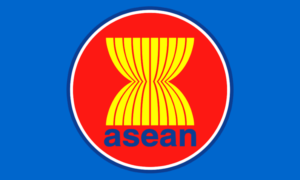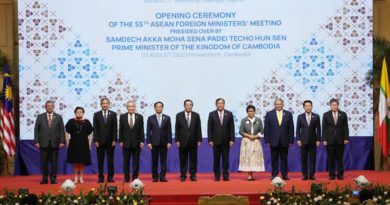ASEAN HEADLINE: South China Sea COC negotiations ‘not going well’
The COC is intended to establish a framework that reflects international norms, principles, and rules, aligning with international law, particularly the United Nations Convention on the Law of the Sea (UNCLOS). Its goal is to achieve a stable, safe, and peaceful South China Sea.
The idea was raised during the public lecture on “Southeast Asia’s Security Concerns in the Age of US-China Rivalry”, organised yesterday by the Cambodian Centre for Regional Studies (CCRS) in collaboration with Pannasastra University of Cambodia’s Faculty of Social Sciences and International Relations, at the university’s Tuol Kork campus.
The South China Sea dispute involves several countries with overlapping territorial claims, primarily China and several Southeast Asian nations, including Vietnam, the Philippines, Malaysia, and Brunei.
This lecture analysed the pressing security challenges facing Southeast Asian states.
It utilised publicly available defence documents from regional states, such as Defence White Papers, and incorporated data from interviews with policymakers, military, and intelligence officials across Southeast Asia.
The study examined the intersection of US-China rivalry and regional security issues across maritime, cyber, and non-traditional security domains.
During the event, Abdul Rahman Yaacob, a Research Fellow in the Southeast Asia Programme at the Lowy Institute, discussed two main reasons hindering the completion of the COC: the negotiation process and China’s tactics.
Rahman’s research focuses on Southeast Asia’s defence and security issues and the region’s relations with major powers.
“So, the process is not going well because, again, of trust, perception, and policy. Some ASEAN negotiators perceive the Chinese as changing the goalposts in some of the negotiations,” he said.
Moving away from China, Rahman said there is also a problem among the ASEAN negotiators, noting that some of them, because their country is not a claimant to the waterway, are not serious in the talks.
“So for some of the claimants, they consider some of the other ASEAN members are slowing down the negotiation process,” he said.
“The other thing is, the zone of applicability, which means the areas where the COC should cover. So there’s also a disagreement among ASEAN member states and China on that issue,” he added.
Adopting a comprehensive perspective on the state of negotiations reveals a significant lack of progress. The next pivotal question is whether, even if claimant state parties reach an agreement to sign a COC, it will have practical implications, he elaborated.
“Maybe after 10 years or 20 years, the question is whether China will accept a legally binding agreement,” he said.
The South China Sea is a focal point of territorial disputes involving China, the Philippines, and other nations.
China claims nearly all of the sea as its sovereign territory, while the Philippines, Vietnam, and other Southeast Asian countries lay claim to various islands, islets, reefs, and shoals along their coastlines.
Cambodia, as a non-claimant state in the South China Sea dispute, has urged all concerned parties to fully and effectively implement the Declaration on the Conduct of Parties in the East Sea/South China Sea (DOC), which was adopted during the 8th ASEAN Summit in Phnom Penh in 2002.
The DOC serves as a framework for managing disputes and promoting cooperation among parties with claims in the South China Sea but lacks binding mechanisms and enforcement provisions.
Cambodia has also urged all relevant parties to officially adopt the DOC.

@[email protected]



 Memento Maxima Digital Marketing
Memento Maxima Digital Marketing






